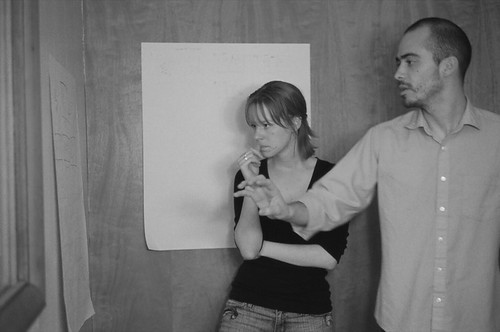Hello everyone,
Today we are going to start preparing for our final presentation.
First let's watch a video. What "tips" for a great presentation does the video give? There are eight tips.
OK, next week is our last class. Have fun preparing your presentations!
This blog serves several purposes: Communicating with my students outside of the classroom, publishing my students' work, and it serves as a resource for both students and teachers.
Thursday, May 30, 2013
Wednesday, May 29, 2013
Presentation 2 Spring 2013 Weeks 7 & 8: More about Voicethread
Hello everyone,
Last week we ran out of time, so let's register for VoiceThread today. Please click the link: Register a new account. After you have registered please watch this video: What's a Voicethread Anyway?
I have created a Voicethread group for us. Please click the link to join the group:
Tsukuba Dai Presentation II Spring 2013 Voicethread Group.
Now, lets learn how to comment. Please click the link and watch My Self Introduction. Then please make a comment and ask a question on each slide.
Next, let's upload our slides. I will come round and show each of you.
Next week we will finish our Voicethread presentations!
Last week we ran out of time, so let's register for VoiceThread today. Please click the link: Register a new account. After you have registered please watch this video: What's a Voicethread Anyway?
I have created a Voicethread group for us. Please click the link to join the group:
Tsukuba Dai Presentation II Spring 2013 Voicethread Group.
Now, lets learn how to comment. Please click the link and watch My Self Introduction. Then please make a comment and ask a question on each slide.
Next, let's upload our slides. I will come round and show each of you.
Next week we will finish our Voicethread presentations!
Tuesday, May 28, 2013
Integrated English 1 2013 Week 6: The Inverted Eagle Chapter 4 Review
Hello everyone!
Today we are going to review Chapter 4 and do the Chapter 4 quiz.
Look at the image above. The image is a mind map showing the suspects, their motives and their lies. Using information from the mind map, make notes in your Detectives Notebook.
Let's review some vocabulary from Chapter 4. Please click this link: Inverted Eagle Chapter 4.
Now look at the comments on the Week 5 lesson blog post. Who did the most students choose as the number one suspect? What were the reasons they gave for their choice?
Next week we will review Chapters 5 and six. We will also do the Chapters 5 and 6 quizzes. Please read Chapters 5 and 6. Please solve the puzzles. Also, don't forget to make good notes in your Detectives' Note Book.
Enjoy!
Thursday, May 23, 2013
Presentation 1 2013 Week 6: The Comparative presentation & how to write an introduction
Hello everyone,
Today we are going to do our comparative presentations. Then we'll start working on our final presentations. Today we'll talk about introductions.
Please click the link to download your final presentation worksheet.
Next week we will talk about the body and the conclusion.
See you!
Today we are going to do our comparative presentations. Then we'll start working on our final presentations. Today we'll talk about introductions.
Please click the link to download your final presentation worksheet.
Next week we will talk about the body and the conclusion.
See you!
Wednesday, May 22, 2013
Presentation 2 Spring 2013 Week 6: Introduction to Voicethread
Hello everyone,
Today we are going to do a lot of speaking practice. First, let's do some speaking practice using English Central. If you haven't joined our class on English Central, please click the link for your class:
Presentation 2: Tuesday 5th.
Presentation 2: Wednesday 3rd.
Now you are member of the class I set up on English Central. Please choose a video and do some speaking practice. While you are using English Central I will come round to each of you and check your PowerPoint Presentations. After I have checked your PowerPoint presentations, please make the changes that I have requested.
Next, let's register for VoiceThread. Please click the link: Register a new account. After you have registered please watch this video: What's a Voicethread Anyway?
Now, lets learn how to comment. Please click the link and watch My Self Introduction. Then please make a comment and ask a question on each slide.
That's all for today. Next week you will make your own VoiceThreads.
Today we are going to do a lot of speaking practice. First, let's do some speaking practice using English Central. If you haven't joined our class on English Central, please click the link for your class:
Presentation 2: Tuesday 5th.
Presentation 2: Wednesday 3rd.
Now you are member of the class I set up on English Central. Please choose a video and do some speaking practice. While you are using English Central I will come round to each of you and check your PowerPoint Presentations. After I have checked your PowerPoint presentations, please make the changes that I have requested.
Next, let's register for VoiceThread. Please click the link: Register a new account. After you have registered please watch this video: What's a Voicethread Anyway?
Now, lets learn how to comment. Please click the link and watch My Self Introduction. Then please make a comment and ask a question on each slide.
That's all for today. Next week you will make your own VoiceThreads.
Monday, May 20, 2013
Cross Cultural Awareness and English 2013 Semester 1 Week 5: Love and Marriage in Bangladesh
Hello everyone, Today we will continue discussing Love and Marriage. Look at the picture above. This is a picture I took of a Bangladeshi bride and groom at a wedding reception I attended in Dhaka, Bangladesh. In the photo below you can see me with my colleagues. The men, including me, are wearing a traditional Bengali shirt called a "panjabi". This shirt is called a Kurta in India. We were a little embarrassed because all the Bangladeshi men wore European business suits.

Let's listen to two people talking about Love and Marriage in Bangladesh. Some people in Bangladesh have arranged marriages. Let's listen to a conversation about arranged marriages on my friend Todd Beukens' great website English Listening Lesson Library Online (ELLLO). Please listen to the conversation and do the quiz.
Next, let's study some vocabulary. Please click the link: Cross cultural awareness and English vocabulary.
Now, let's learn more about Bengali weddings. Please click the link. Read the article and answer the questions:
1. What is a Ghotok?
2. What are the parts of the Bengali wedding?
3. What is Gaye holud?
4. What is the Mahr?
5. Who arranges the wedding ceremony?
6. What do many of the wedding ceremony traditions revolve around?
7. Who arranges the reception?
8. What is the "flower bed" ceremony?
Finally, please leave a comment. What do you think of Bengali wedding traditions?
Wednesday, May 15, 2013
Presentation 2 Spring 2013 Week 5: Making slides
 |
| Death by Powerpoint (and how to fight it) |
Today we are going to learn about making good slides. So many presenters make very bad slides that we have a new expression in English: Death by Powerpoint. Click the link to read a Japanese blog post about Death by Powerpoint.
You can get some great FREE tips from Garr Reynolds' website too.
OK, let's make some great slides now! Please use your own photos and images, or if you don't have your own photos and images please use only photos and images with a Creative Commons licence. You can read about Creative Commons licences here: クリエイティブ・コモンズ. You can find Creative Commons Images on Flickr, or by doing an advanced search in Google.
Please finish your slides by the end of the class.
Next week we will learn about Voicethread!
Tuesday, May 14, 2013
Integrated English 1 2013 Week 5: The Inverted Eagle Chapter 3 Review & Quiz 3
Hi everyone! Today we are going to review Chapter 3.
First, let's review some vocabulary. Click this link: Inverted Eagle Chapter 3 Vocabulary.
Now let's read a great summary of Chapter 3 by Martina R., a student in Stuttgart, Germany:
You can read Martina's entire review of The Inverted Eagle on Karenne Sylvester's great blog Kalinago English.
Finally, please post a comment. Who do you think dunit? Click the link to learn how to post a comment.
 | |
| Illustration by Yuji Tachikawa. CC V1.0 Some rights reserved |
Now let's read a great summary of Chapter 3 by Martina R., a student in Stuttgart, Germany:
Chapter 3 – The Hospital
The first lie: Judith told Ellie that she lied concerning the combination of the wall safe, she gave the numbers to Kevin. Because of her age, Judith forgot, that she also gave the combination to Miguel. After this, Ellie wanted to hear the whole story. Judith started to tell the story which had begun a month ago with the purchase of a beautiful stamp.At the end of the conversation between Ellie and Judith Reed, Yokota, a colleague of Ellie, and Kevin entered the room. Ellie saw Kevin and she accused him of lying to her.The next steps: Elle checked the stories of the involved people and wanted to search the house from the top to bottom.
After that, Ellie drove to the hospital where Evan and Nancy Reed were staying. Nancy was sleeping and Even was telephoning someone with his cell phone. Ellie stopped in front of the door and tried to understand the call between Evan and the other person. The words (which) she heard were “Brian … investors …. excited about the project – to get money together”. ...a few seconds after the call, Ellie went into the room and introduced herself to the Reeds. Then she told the Reeds a part of her investigation. It was surprising, that Evan accused his son of committing the robbery, because the Reeds wanted that Kevin tried to find a job and they had informed him that they were stopping his monthly allowance. Later, Ellie asked the Reeds to describe the occurrences which happened last night separately?At the end of the Chapter, Yokota called Ellie and told her that there might be a new motive ….
You can read Martina's entire review of The Inverted Eagle on Karenne Sylvester's great blog Kalinago English.
Finally, please post a comment. Who do you think dunit? Click the link to learn how to post a comment.
Monday, May 13, 2013
Cross Cultural Awareness and English 2013 Semester 1 Week 4

Hello everyone,
Today we are going to review last week's class and then talk about Jewish wedding traditions.
First, let's review some vocabulary. Please click the link: Cross Cultural Awareness and English Vocabulary.
Let's listen to a mantinada. The song is called
Ο ΥΜΝΟΣ ΤΗΣ ΜΑΝΑΣ - ΓΙΩΡΓΟΣ ΖΕΡΒΑΚΗΣ .
Please click the link.
Vicky Loras tells us that the title means, "Hymn to Mother". The singer says that there are many kinds of love in the world but the one kind of love that stands out is love for one's mother. Why do you think that a man might sing a song about his love for his mother at his wedding?
Here is a mantinada shared by Christina Markoulaki, a teacher in Heraklion, which is the capital of Crete:
Σιγά-σιγά μη βιάζεστε κι η πόρτα μας θ’ ανοίξει, γιατί έχει η νύφη αδέλφια και γονείς να τσ’ αποχαιρετίσει.
Christina says, "...this mantinada warns the guests not to
hurry because the bride will take her time to say goodbye to her family." This matinada shows the very strong connection between the couple and the family, which Christina says is,"... an entirely Greek phenomenon!"
Let's listen to this mantinada now.
Ok, now let's turn to p.135 in our text book. Let's read about Jewish wedding traditions.
See you next week.
Thursday, May 09, 2013
Presentation 1 2013 Week 4: Voice Inflection and the Demonstration Speech
Hello everyone,
Today, after you do your layout presentations, we will learn about voice inflection. After that, we will prepare for our next presentation, the demonstration presentation.
Let's watch a demonstration of how to make ramen.
Now it's your turn. Please prepare a demonstration of your favourite dish.
See you next week!
Today, after you do your layout presentations, we will learn about voice inflection. After that, we will prepare for our next presentation, the demonstration presentation.
Let's watch a demonstration of how to make ramen.
Now it's your turn. Please prepare a demonstration of your favourite dish.
See you next week!
Wednesday, May 08, 2013
Presentation 2 Spring 2013 Week 4: Storyboarding
 Hello everyone,
Hello everyone,I hope you enjoyed Golden Week.
Today we are going to storyboard our first presentation. After that we will edit and rewrite our script.
Please click the link to download the Writing Error Codes handout. Look at the writing error codes and comments on your script. Correct your errors and rewrite your script.
Tuesday, May 07, 2013
Integrated English 1 2013 Week 4: The Inverted Eagle Chapter 2 Review & Quiz 2
Hey everyone,
I have some exciting news. You can win a free book! Click the link to learn how you can win a free book: Win free CYOA graded readers! OK, now let's go to amazon.jp and review Cup of Death.
Today we are going to review Chapter 2 and preview Chapter 3.
First, let's review some vocabulary. Please sign into Quizlet and study the Chapter 2 vocabulary.
Next let's check the answer to the puzzle. With your group check your answers and share the vocabulary and notes you made in your detective's notebook.
Create your own mind maps at MindMeister
For homework please do the Chapter 3 tasks and puzzle. See you next week!
I have some exciting news. You can win a free book! Click the link to learn how you can win a free book: Win free CYOA graded readers! OK, now let's go to amazon.jp and review Cup of Death.
Today we are going to review Chapter 2 and preview Chapter 3.
First, let's review some vocabulary. Please sign into Quizlet and study the Chapter 2 vocabulary.
Next let's check the answer to the puzzle. With your group check your answers and share the vocabulary and notes you made in your detective's notebook.
Create your own mind maps at MindMeister
For homework please do the Chapter 3 tasks and puzzle. See you next week!
Cross Cultural Awareness and English 2013 Semester 1 Week 3: Love and marriage in Greece
 Hello everyone!
Hello everyone!Today we are going to learn about love and marriage in Greece.
Last week we learned about dowries. Dowries are a part of Greek culture too. It's interesting that two very different cultures, China and Greece, can share a cultural tradition, isn't it?
You can learn more about Greek wedding traditions by clicking the link: Ten Greek Wedding Traditions.
Vicky Loras, a Greek Canadian teacher of English told me the following about weddings in Greece:
Today's article is about μαντινάδες (Mantinades), which are love poems sung at weddings on the island of Crete. Crete is the largest island in Greece. It was once the centre of the ancient Minoan civilization, which was the oldest civilization in Europe, so Crete has a rich cultural tradition. This rich cultural tradition has given the people of Crete some wonderful wedding customs, including the Mantinades.
You can learn more about Greek wedding traditions by clicking the link: Ten Greek Wedding Traditions.
Vicky Loras, a Greek Canadian teacher of English told me the following about weddings in Greece:
In many parts around Greece they still celebrate weddings in a traditional way. Some traditions still kept are:- The families of the couple pin paper money on the bride and groom (which they can then keep of course!)- Single people (usually women!) write their names on the bride's shoe soles. As she walks and dances throughout the day, some names get erased. Tradition has it, that the people's names that are erased are the next to get married!- In some villages, the bride and groom each go to church on foot, accompanied by their families. A relative walks in front and holds a Greek flag on a pole, which has a cross on top. They attach three apples on each point of the cross, which symbolises fertility.
- Towards the end of the ceremony, the guests throw rice at the couple, which symbolises fertility and food. It can be a pretty slippery situation though, with all that rice on the floor!If you would like to ask Vicky more about Greek culture, you can follow her on Twitter - @vickyloras
Today's article is about μαντινάδες (Mantinades), which are love poems sung at weddings on the island of Crete. Crete is the largest island in Greece. It was once the centre of the ancient Minoan civilization, which was the oldest civilization in Europe, so Crete has a rich cultural tradition. This rich cultural tradition has given the people of Crete some wonderful wedding customs, including the Mantinades.
Before we learn about the Mantinades, let's study some vocabulary. Please click the link: Crosscultural awareness and English Vocabulary.
Now let's listen to a mantinada. The song is called Ο ΥΜΝΟΣ ΤΗΣ ΜΑΝΑΣ - ΓΙΩΡΓΟΣ ΖΕΡΒΑΚΗΣ . Please click the link:
Vicky tells us that the title means, "Hymn to Mother". The singer says that there are many kinds of love in the world but the one kind of love that stands out is love for one's mother. Why do you think that a man might sing a song about his love for his mother at his wedding?
Ok, now please turn to p. 142.
What do you think of Mantinades? Are there any similar types of poetry in Japanese culture, or in the cultures of other peoples? Post a comment below.
See you next week!
Wednesday, May 01, 2013
Presentation 1 Week 3: More gestures and the layout presentation
 Hello everyone,
Hello everyone, Today we are going to do our first presentation.
After that we are going to practice using gestures some more. Look at the picture on the left. What does the gesture mean? Do you ever make this gesture?
Our next presentation is a layout presentation. A layout speech describes where things are, their size and their shape. Your next presentation will be about your room. Draw a map of your room on A3-size paper. Your presentation should be 1 minute. You will be tested on your posture, eye contact, voice volume, gestures and the content of your presentation. Don't forget to practice with a partner, or in front of a mirror.
See you next week.
Subscribe to:
Comments (Atom)




